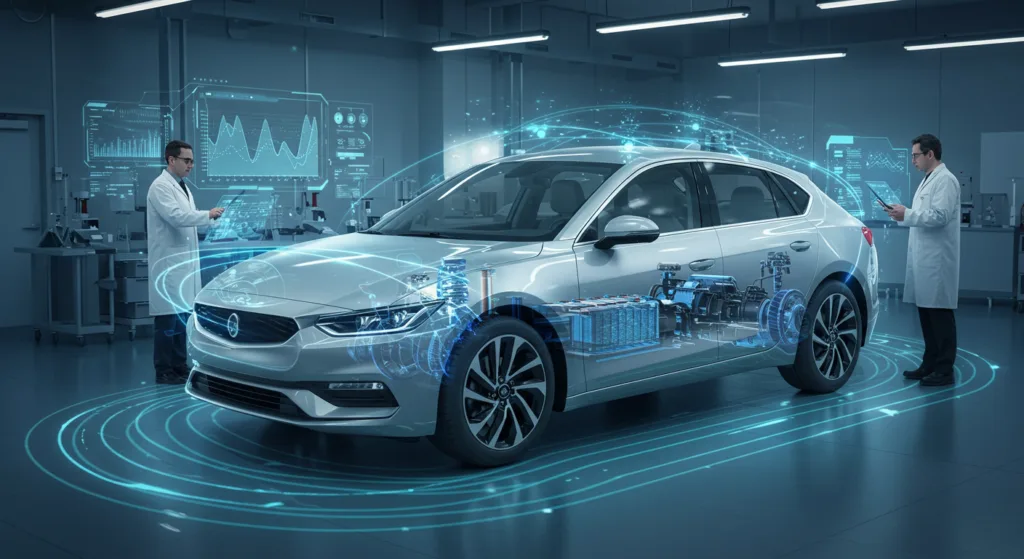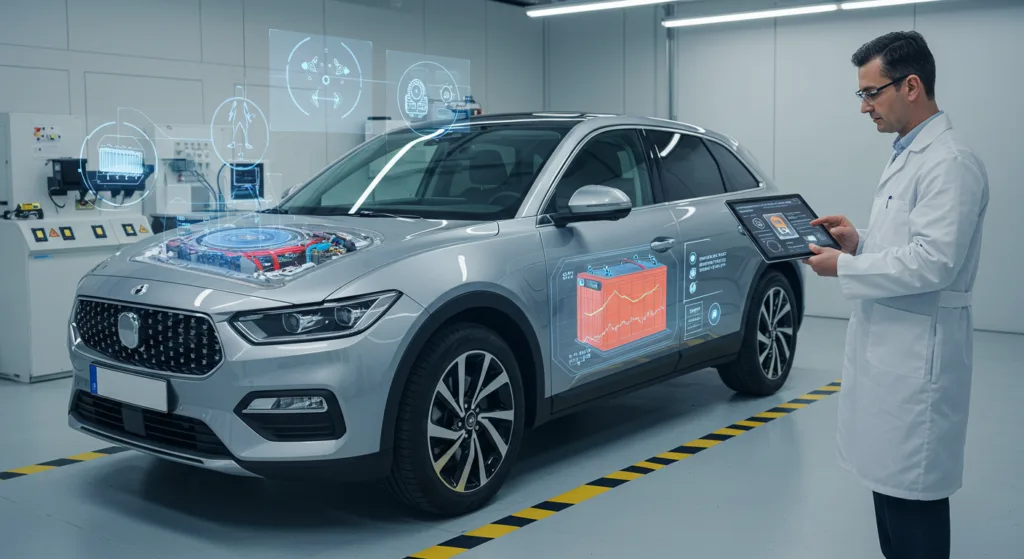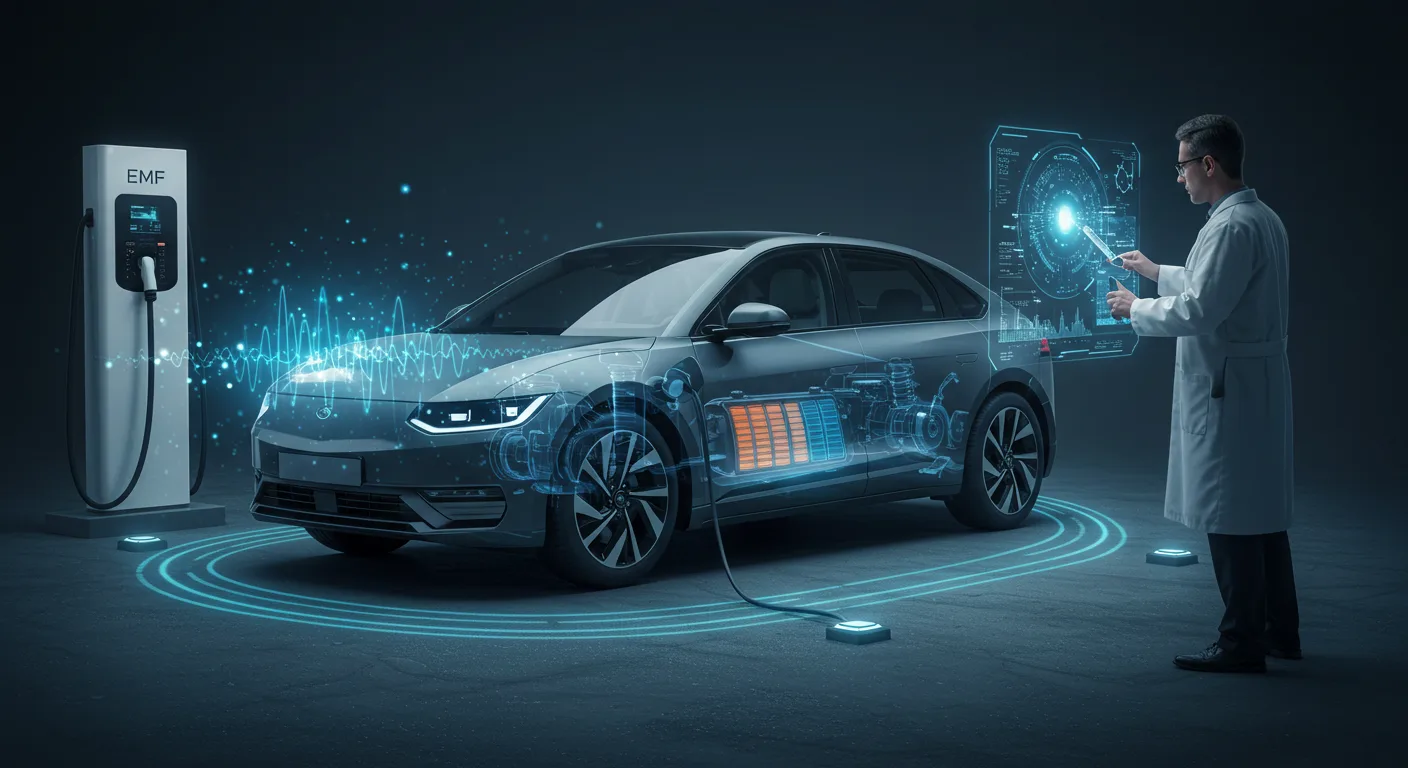Understanding Radiation in Electric Cars

Electric vehicles (EVs) have revolutionized transportation, offering eco-friendly alternatives to traditional gasoline-powered cars. However, concerns about electromagnetic radiation have led many to ask, “Do electric cars give off radiation?” To address these concerns, it’s essential to understand the types of radiation involved, how EVs compare to other devices, and whether they pose more risks than conventional cars.
What Kind of Radiation Do Electric Cars Emit?
Electric cars primarily emit non-ionizing electromagnetic fields (EMFs) during operation and charging. These EMFs are categorized into:
- Static Magnetic Fields (SMF): Produced by direct current (DC) components, such as batteries.
- Extremely Low-Frequency Magnetic Fields (ELF): Generated by alternating current (AC) components, like electric motors and inverters.
- Radiofrequency (RF) EMFs: Emanate from wireless communication systems within the vehicle, including Bluetooth and Wi-Fi.
Research indicates that the strength of these fields varies based on the vehicle’s design and operating conditions. For instance, higher EMF levels are often detected near the footwells due to the proximity to electrical components.
How Does EMF Exposure Compare to Other Devices?
When comparing EMF exposure from electric vehicles to other common sources, EVs generally emit lower levels. Consider the following:
- Household Appliances: Devices like microwaves and refrigerators emit EMFs comparable to or higher than those from EVs.
- Power Lines: Living near high-voltage power lines can result in higher EMF exposure than driving an electric car.
- Mobile Phones: Prolonged use of mobile phones exposes users to RF EMFs, often at levels higher than those experienced inside EVs.
These comparisons suggest that the EMF exposure from electric vehicles is within the range of everyday devices and is generally considered safe.
Are Electric Vehicles More Harmful Than Gas Cars?
Concerns about EMF exposure in electric vehicles often lead to comparisons with traditional gasoline-powered cars. Key points include:
- EMF Levels: Both EVs and internal combustion engine (ICE) vehicles emit EMFs due to electrical systems. However, studies have shown that EMF levels in EVs are comparable to those in conventional cars and well below international safety limits.
- Health Impacts: Current scientific evidence does not indicate any adverse health effects from the EMF levels encountered in electric vehicles.
- Environmental Benefits: EVs offer significant reductions in air pollutants and greenhouse gas emissions compared to gasoline cars, contributing positively to public health and the environment.
In conclusion, while electric vehicles do emit EMFs, the levels are comparable to those from everyday electronic devices and are considered safe based on current research. The environmental advantages of EVs further underscore their role in promoting sustainable transportation.
✅ EMF levels in EVs are non-harmful – They fall well below global safety standards.
The Science Behind EMF and Electric Vehicles

Electric vehicles (EVs) have become increasingly popular as eco-friendly alternatives to traditional gasoline-powered cars. However, concerns about electromagnetic fields (EMFs) emitted by EVs have arisen. Understanding the scientific research behind EMFs in electric vehicles is essential for addressing these concerns.
What Studies Say About EMF in Electric Cars?
Extensive research has been conducted to assess the levels of EMF exposure in electric vehicles and their potential health implications. Key findings include:
- EMF Levels Within Safety Limits: Studies have shown that the EMF levels inside EVs are generally below the exposure limits recommended by international guidelines. For instance, research indicates that the extremely low frequency (ELF) magnetic fields in EVs are within safe limits.
- Comparative Studies: A study involving multiple electric cars found that the EMF exposure experienced by EV drivers is lower than 20% of the value recommended by the International Commission on Non-Ionizing Radiation Protection (ICNIRP).
- Long-Term Monitoring: Long-term studies have monitored ELF magnetic fields in EVs over extended periods, concluding that regular maintenance does not significantly influence EMF levels, but major repairs or accidents may necessitate monitoring to ensure safety.
These findings suggest that EMF exposure in electric vehicles is generally within internationally accepted safety standards.
Do EV Batteries and Motors Produce Harmful EMF?
The primary sources of EMFs in electric vehicles are the batteries and electric motors. These components operate using electrical currents, which inherently generate electromagnetic fields. Key considerations include:
- Non-Ionizing Radiation: The EMFs emitted by EV batteries and motors are classified as non-ionizing radiation, meaning they do not have enough energy to ionize atoms or molecules or cause DNA damage.
- Field Strength and Frequency: The strength and frequency of EMFs in EVs are similar to those emitted by common household appliances, such as refrigerators and microwaves.
- Design and Shielding: Manufacturers design EVs with shielding and grounding techniques to minimize EMF exposure to occupants.
Current evidence indicates that the EMFs produced by EV batteries and motors are not harmful to human health.
🔋 “Electric cars are the future, and science proves they are safe.”
Can EMF from Electric Cars Affect Human Health?
The potential health effects of EMF exposure from electric cars have been the subject of various studies:
- Cancer Risk: While some studies have explored a possible link between long-term exposure to ELF magnetic fields and certain health risks, such as leukemia, the EMF levels in EVs are typically much lower than those associated with increased risk.
- Regulatory Guidelines: International bodies, including the World Health Organization (WHO) and the International Commission on Non-Ionizing Radiation Protection (ICNIRP), have established guidelines for EMF exposure. The EMF levels in electric vehicles are generally well below these recommended limits.
- Overall Assessment: The consensus in the scientific community is that the EMF exposure from electric vehicles does not pose a significant health risk to occupants.
In summary, current scientific evidence does not support the notion that EMF exposure from electric vehicles adversely affects human health.
How to Reduce EMF Exposure in an Electric Car

Electric vehicles (EVs) have become increasingly popular due to their environmental benefits and technological advancements. However, some individuals express concerns about potential electromagnetic field (EMF) exposure while using these vehicles. Understanding how to mitigate EMF exposure can enhance confidence and safety among EV users.
Do Shielding and Distance Reduce EMF Levels?
Electromagnetic Shielding:
- Design Integration: Manufacturers incorporate electromagnetic interference (EMI) shielding materials, such as aluminum, into EV designs to minimize EMF exposure. These materials can achieve shielding effectiveness of over 70 dB, offering substantial protection against electromagnetic interference.
- Battery Enclosures: The metal casing of EV batteries serves as an effective shield, reducing EMF emissions within the vehicle cabin.
Distance Considerations:
- Proximity to EMF Sources: EMF intensity decreases significantly with increased distance from the source. In EVs, components like inverters and electric motors are strategically placed away from passenger seats to minimize exposure.
- Vehicle Design: The layout of electrical components in EVs is optimized to ensure that high-EMF-emitting parts are positioned away from occupants, further reducing potential exposure.
⚡ “EMFs are everywhere, but research ensures EVs remain well within safe limits.”
What Are the EMF Safety Standards for EVs?
International Guidelines:
- ICNIRP Guidelines: The International Commission on Non-Ionizing Radiation Protection (ICNIRP) provides exposure limits for EMFs to protect public health. EMF levels in EVs are generally well below these recommended limits.
- IEEE Standards: The Institute of Electrical and Electronics Engineers (IEEE) has established safety standards for human exposure to electromagnetic fields, covering frequencies relevant to EV operations.
Regulatory Compliance:
- Automotive Standards: Standards such as ISO 7637 address electromagnetic compatibility in road vehicles, ensuring that EVs meet specific criteria for EMF emissions and immunity.
- Manufacturer Testing: EV manufacturers conduct rigorous testing to ensure compliance with EMF safety standards, prioritizing passenger safety and comfort.
Should You Be Concerned About EMF in Your EV?
Current Research Insights:
- Health Risk Assessments: Comprehensive studies have found no conclusive evidence linking EMF exposure from EVs to adverse health effects. The levels of EMF detected inside EVs are comparable to those found in conventional vehicles and are within international safety guidelines.
- Expert Consensus: Organizations such as the Federal Office for Radiation Protection (BfS) state that, based on current scientific knowledge, passengers in electric cars are not endangered by electric or magnetic fields.
Practical Considerations:
- Everyday Exposure: The EMF exposure experienced while using an EV is similar to that from common household appliances, such as refrigerators and microwaves.
- Continuous Monitoring: Ongoing research and technological advancements aim to further reduce EMF emissions in EVs, enhancing safety and public confidence.
In conclusion, current evidence suggests that EMF exposure in electric vehicles is minimal and within established safety standards. Manufacturers’ use of effective shielding and adherence to international guidelines contribute to the safe use of EVs. Therefore, concerns about EMF exposure should not deter individuals from considering electric vehicles as a sustainable transportation option.
Do electric cars give off radiation? Research shows that while EVs emit electromagnetic fields (EMFs), the levels are low and well within international safety limits. Modern electric vehicles are designed with shielding and safety standards to minimize exposure, making them as safe as conventional cars.
If you found this article helpful, share it on social media to help others understand the facts about EV radiation! 🚗⚡



